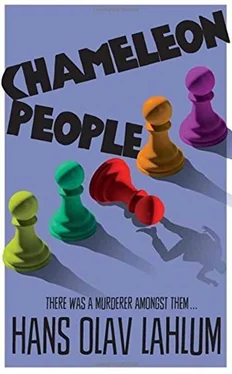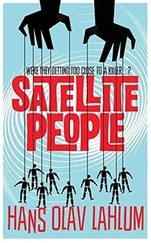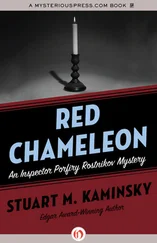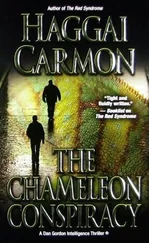
Hans Olav Lahlum
Chameleon People
The fourth book in the DI Kolbjorn Kristiansen series, 2016
Translated from the Norwegian by Kari Dickson
Dedicated to Ross Macdonald,
the last of the great classic crime writers and the last of my sources of literary inspiration for this series…
DAY ONE: The Boy with the Red Bicycle
It was the year that the referendum on Norway’s potential membership of the EEC nearly caused my parents to divorce after forty-two years of happily married life. On Saturday, 18 March 1972, the day’s talking point was the demonstration that took place in the centre of Oslo, drawing several thousand protestors who were against membership of the EEC. As many as thirty extra policemen had been drafted in, in case of disturbances which, in the end, never happened. The demonstration broke up peacefully around eight o’clock in the evening.
As a detective inspector, I was exempt from demonstration duties, which was a particular relief now, as my private life had changed.
My fiancée, Miriam Filtvedt Bentsen, had agreed to come by for an early meal at around half past four. She arrived with sparkling eyes and flushed cheeks, having come straight from tobogganing with her much younger niece, and it has to be said, it was not easy to tell who had enjoyed it most. I had gently but firmly declined her cheerful invitation to join them. I found it embarrassing enough that someone I knew might meet the young, female master’s student whizzing by on a sledge, let alone if she then had me, a detective inspector, in tow. Her childlike joy at the arrival of winter was a side of Miriam’s complex nature that still perplexed me, although I did find it refreshing and charming.
As usual, we had a couple of very pleasant hours together. Of course, neither of us mentioned the fact that she was going to the evening’s demonstration and that I could not go with her.
Instead we talked about the injuries to her arms and shoulders, which were, fortunately, getting better. She could now write for several hours at a time and was increasingly optimistic about her prospects for achieving a master’s degree in Nordic Studies. She had done even better than expected in her bachelor’s degree and very well with her first essay on the new course. She’d sounded even happier than usual when she rang to tell me earlier in the day. So the atmosphere was very jolly when we raised our glasses to her success, to each other and to our future together.
Afterwards, we talked a bit about the approaching football season and then Norway’s hopes for gold at the Olympic Games in Munich in the summer. And finally, about our wedding plans. She thought that it would be practical to have it all sorted before the Christmas holidays. I suggested that it might be both good and practical if we could have an autumn break. So we drank to that, without specifying the dates or any other details.
At exactly half past six, Miriam got up and said with a little smile that unfortunately she had to go now. I said that I could not go with her this time either, adding an ‘unfortunately’. Despite my father’s protests, I had allied myself with my mother in the EEC debate. This was largely due to my fiancée. Miriam seemed to be relieved the day I told her, but nodded with understanding when I said I had to keep a low profile all the same, because of my position. We smiled fondly at each other, and kissed fleetingly by the door.
I stood alone by the window and watched my Miriam go. It struck me that her movements were softer and more relaxed now than when she first came to visit. As always, she walked at a fast and determined pace, reading a book at the same time, and did not look back. And in a strange way, this conveyed a certain trust. It felt as though I did not need to stand here, but I did so all the same just to see her for a few moments more. She didn’t look back because she knew that I would be standing here, watching her for as long as I could.
On that particular day, I remained standing there for some time even after she had disappeared down the hill in front of the house. I knew that she would under no circumstances return before the demonstration was over. But I was equally certain that she would come back as agreed for Sunday lunch the following day.
From time to time, I was still woken by a nightmare that Miriam was once again lying in a coma at Ullevål Hospital and the senior doctor had told me that she would not live through the night. And sometimes, when awake, I shuddered at the thought of how close I had been to losing her. Fortunately, both happened less and less frequently these days. Miriam herself was remarkably untouched. She would to a greater or lesser extent always be affected by the injuries to her shoulders, the doctor said. But Miriam’s attitude was that she was far less bothered by them now, and it could have been so much worse. If she did ever shed a tear over her chronic injuries, I certainly never saw it.
In fact, my fiancée had an impressive ability to see the bigger picture and to think constructively, without allowing her life to be blighted by the accident in which she had so innocently and undeservedly been caught up. She also possessed a remarkable blend of clear-sighted realism and irrepressible optimism that never ceased to fascinate me.
Now, as I had on my thirty-seventh birthday three days earlier, I reflected on how immeasurably my life had improved since that great drama in the summer of 1970. I was an exceptionally lucky man. Thanks to Miriam, my private life felt more settled and yet more exciting than it had ever felt before. And at work, it had been a quiet year with only routine work. My status as hero in both the police force and with the general public, arising from several widely reported murder cases in the past four years, remained intact, and I had had no reason to defend it in the face of new challenges thus far in 1972.
In brief, life felt good and secure in every way, and I was almost without a care in the world.
As I turned away from the window at a quarter to seven, ready to sit down on the sofa with my book for the week and the day’s news on the radio, I still had no idea as to just how eventful the evening would turn out to be. Nor did I know how swiftly and dramatically my life would change over the following seven days.
At eight o’clock, I put down Johan Borgen’s novel, The Red Mist , and turned my attention to the news. The mass demonstration against EEC membership was, as expected, the first item. At ten past nine, however, the programme was interrupted by a news flash to say that the well-known Centre Party politician, landlord and businessman, Per Johan Fredriksen, had been stabbed on a street by Majorstuen station barely half an hour before. The presumed attacker had been seen running away from the scene of the crime and the victim’s condition was as yet unknown. There was little else to be said at this point, but the newsreader promised there would be more information in later bulletins.
As I listened, I got up and wandered over to the living-room window, my eyes focusing on the only movement on the street below.
The movement turned into a red bicycle of the simplest and cheapest type, previously sold by the Coop. It was approaching at alarming speed, given that the bike looked rather rickety and the cyclist rather small. At first I thought it was a woman, but then realized that it was a thin, dark-haired boy of around fifteen. He was definitely neither strong nor big for his age, and he was clearly out of puff. However, he hung doggedly on to the handlebars and pedalled furiously up the last part of the slope.
Читать дальше













